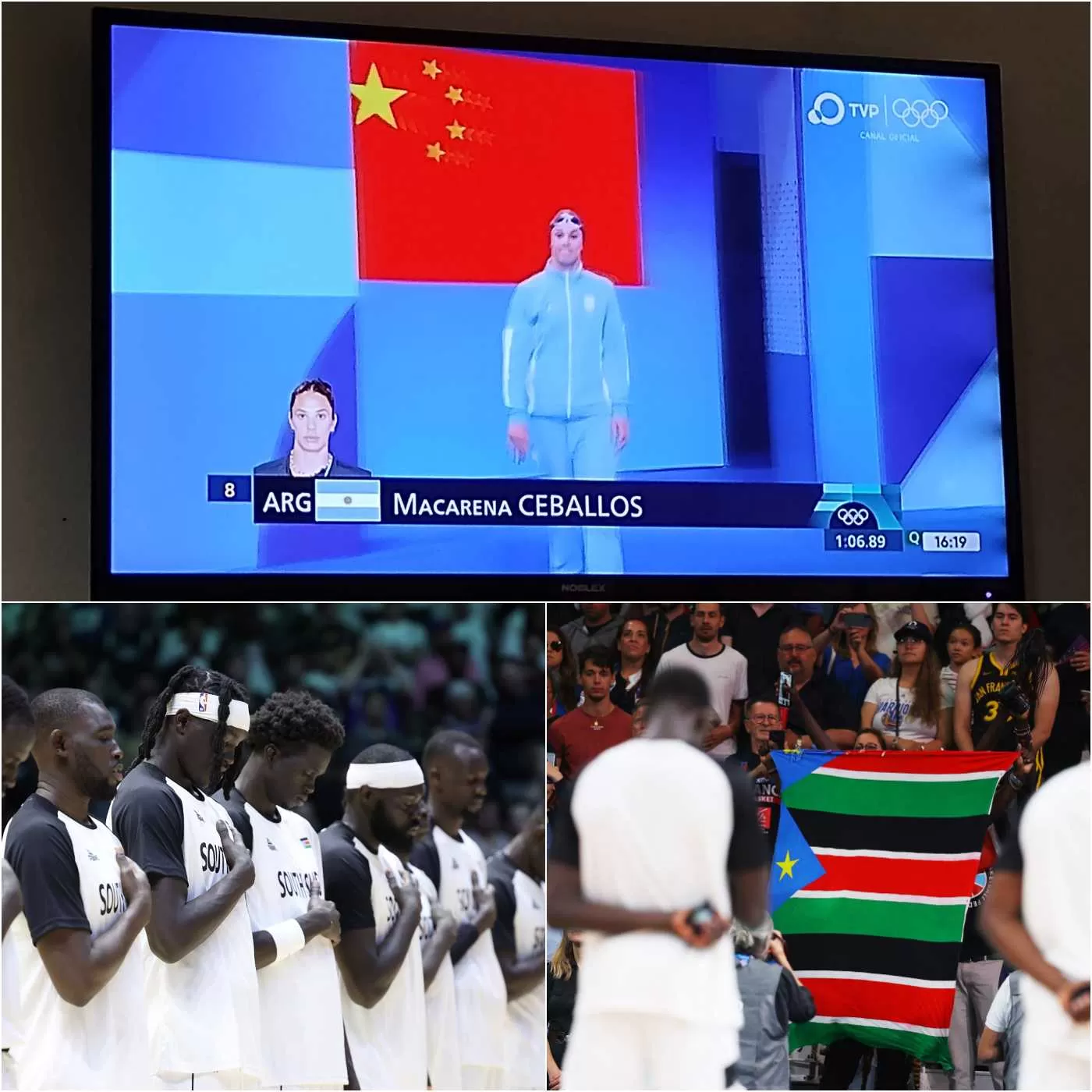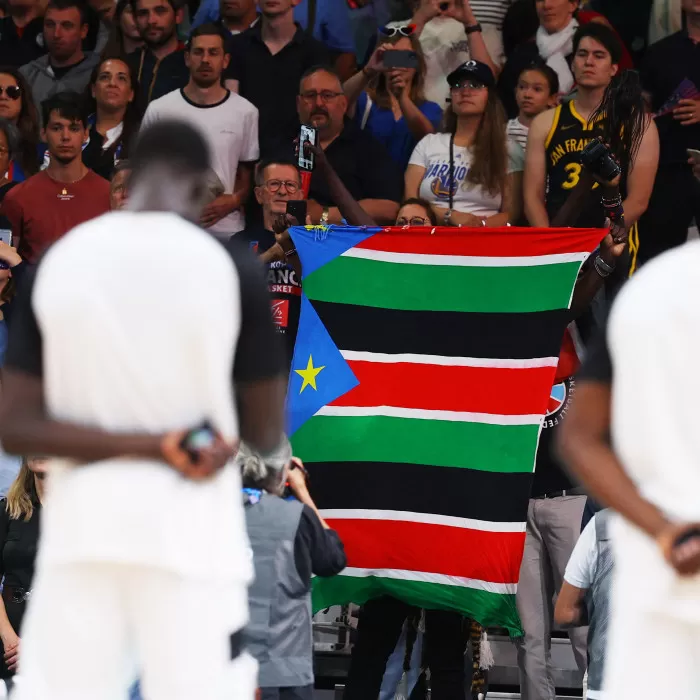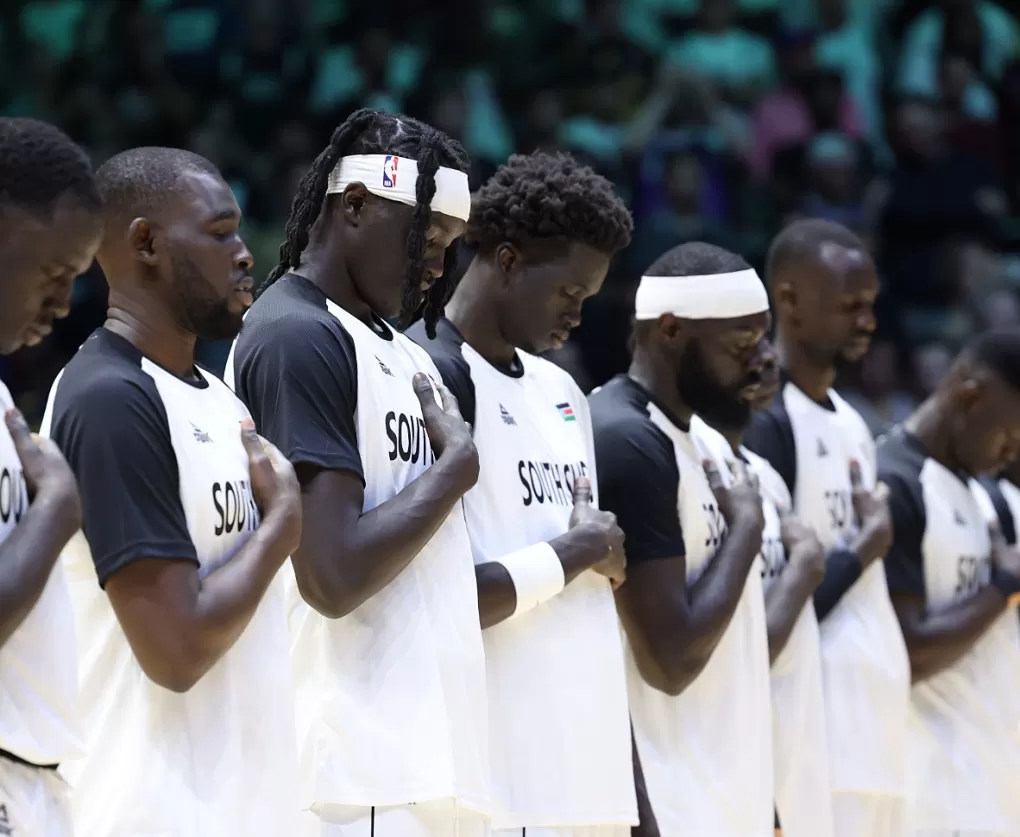On the second day of the Paris 2024 Olympics, there were some notable mishaps: the South Sudanese national anthem was incorrectly played in basketball, and the Argentine flag was incorrectly displayed during swimming.

On the evening of July 28, South Sudan defeated Puerto Rico 90-79 in Group C of men’s basketball, marking their debut at the Olympics. However, before the victory, the organizers mistakenly played the national anthem of neighboring Sudan and had to apologize immediately for this blunder.
South Sudan gained independence from Sudan following a referendum in 2011, but border disputes, natural resources, and political power continue to cause armed conflicts between the two countries.
South Sudanese athletes placed their hands on their chests and bowed their heads when they realized the wrong anthem was played during the opening match of Group C in men’s basketball at the Paris 2024 Olympics. (Photo: NEBA)
The incorrect anthem was cut after 20 seconds of play. South Sudanese athletes appeared confused initially, while fans at the Pierre Mauroy arena began to boo. Later, they applauded when they saw the athletes bow and place their hands over their hearts while waiting for the issue to be resolved. The Puerto Rican players also showed solidarity by doing the same.

About three minutes later, the correct anthem was played to the applause of the fans. When it concluded, the South Sudanese players hugged each other and then entered the match.
South Sudan fans raised flags to support their basketball players when they realized the wrong anthem was played. (Photo: Reuters)

“They played the wrong anthem, but the players sang it right,” South Sudan’s American coach, Royal Ivey, told the Associated Press. “We all make mistakes. I will definitely have something to say about this. But in the end, the players are all brothers.”

Earlier, in the women’s 100m breaststroke semi-final, when swimmer Macarena Ceballos was being introduced, the electronic board behind her unexpectedly displayed the Chinese flag instead of Argentina’s. Ceballos looked back and laughed, while there were no Chinese athletes in the heat.
Ceballos finished her race in eighth place – last – with a time of 1 minute 7.31 seconds, failing to qualify for the final. In a post-race interview with TyC Sports, the Argentine swimmer didn’t comment on the flag error. Instead, she focused on her performance, expressing frustration that she hadn’t trained enough to achieve better results.

However, the video of the incident quickly went viral on the Internet, angering many Argentinians. “Shameful treatment of Argentinians at the 2024 Olympics,” one user commented on Twitter. Another user suggested that Argentina was being retaliated against following Enzo Fernandez’s racist remarks on July 14, when he sang about French players after winning the Copa America 2024.
This incident marked the second mishap involving Argentina at the Olympics. The first occurred when Argentina lost 1-2 to Morocco in their opening match of Group B in men’s football on July 24. Argentina equalized 2-2 in the 16th minute of second-half stoppage time, but the match was paused when fans threw objects and stormed the field. After a nearly two-hour delay, play resumed, and the referee disallowed Argentina’s goal due to offside. The teams played three more minutes without spectators, with Morocco maintaining a 2-1 lead.
Before these incidents, the Paris 2024 Olympic organizers had already apologized for mishaps during the opening ceremony on July 26. Initially, the host announced South Korea’s team as North Korea. Later, the organizers again apologized when parts of the ceremony were criticized for being “religiously offensive” and “crossing moral boundaries,” leading to a wave of intense criticism.
News
Cardi B surprised her 170 million followers with her bold action during a livestream, showing off her breasts to celebrate the release of her new music video! – S
While livestreaming on her personal page with nearly 170 million followers, female singer and rapper Cardi B suddenly opened her shirt to show off her bust because she was excited about the release of her new MV. At a livestream on…
Chrisean Rock Finally “Breaks Silence” On Cardi B’s Cheating Claims With Offset – S
In this jaw-dropping update, Chrisean Rock spills the tea on the recent scandal involving her and Cardi B’s ex, Offset. Things are about to heat up as she addresses Blueface’s cheating allegations, leaving fans on the edge of their…
Cardi B and Offset turned up the sexy heat as they enjoyed his “Set It Off” album release party in Miami. – S
Cardi B and Offset create a sexy vibe as they party the night away at his Set It Off album release party in Miami Cardi B and Offset created a sexy tone as they partied the night away in Miami Friday. The couple…
Irrefutable video evidence has been discovered of Offset having a relationship with Chrisean Rock, as the two are seen kissing each other in public: The truth is shocking! – S
After confirming her breakup from Offset during an Instagram Live on Sunday amid rumors he cheated on her with Chrisean Rock (which he has denied), the WAP star returned to the ‘gram on Friday with a heartbreaking, rage-induced rant! In the stream, which was captured and reposted by various outlets,…
Cardi B just shocked the world when she revealed on live TV that “Blue Ivy is p.r.e.g.n.a.n.t!” and didn’t forget to send a surprise congratulation. What’s going on? – S
In a shocking twist that has the internet buzzing, Cardi B set social media on fire after claiming that Blue Ivy, the daughter of Beyoncé and Jay-Z, is pregnant! The unexpected announcement came during a live TV interview when Cardi…
Cardi B Dragged Into Nicki Minaj and Megan Thee Stallion Beef As Social Media Reacts To “Hiss” – S
The Ongoing Feud: Cardi B, Megan Thee Stallion, and Nicki Minaj The hip-hop landscape is buzzing with tension as the feud between Megan Thee Stallion and Nicki Minaj intensifies. In the center of this storm is Cardi B, a fierce…
End of content
No more pages to load











